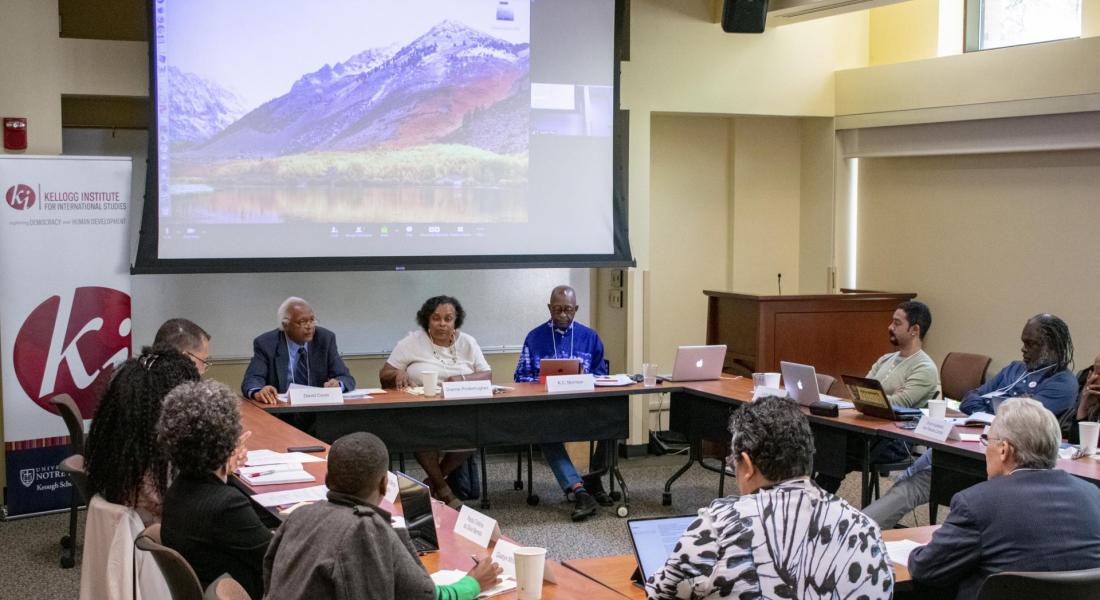
They may be thousands of miles apart, but Brazil and the United States have some things in common: Both are among the largest democracies in the Americas, and both have sizeable black populations largely descended from enslaved Africans.
And, according to an interdisciplinary group of scholars who met recently at the University of Notre Dame, both nations continue to struggle with legacies of racism – even as they are governed by similar populist leaders intent on rolling back protections for minorities.
“The challenges we’re facing in the US are similar to what people are facing in Brazil,” said Faculty Fellow Dianne Pinderhughes, organizer of “The Collaborative Study of Race in the Americas” conference, held July 24-26 at the Hesburgh Center.
The event, co-sponsored by the Kellogg Institute for International Studies, the Institute for Scholarship in the Liberal Arts, and the Rooney Center for the Study of American Democracy, focused on how populations of African descent – not only in Brazil and the US, but throughout Latin America – take part in democracy and public life.
Several dozen scholars from the United States, Brazil, and other Latin American countries attended the conference. Sessions addressed topics including black revolutionaries in Cuba, race and social movements in the Americas, and Afro-Brazilian social action.
A number of Kellogg Institute faculty fellows spoke at the event, including political scientist Michael Coppedge, a principal investigator for the Varieties of Democracy project; Samuel Valenzuela, a sociology professor; associate professor of history Karen Graubart; Marisel Moreno, an associate professor of Latino/a literature; and English and Africana studies professor Mark Sanders.
Sarah Mustillo, dean of the College of Arts and Letters, also addressed the conference before a panel that included presentations by Notre Dame faculty on their research on the African Diaspora, race, and ethnicity.
The conference was part of the second generation of the Race and Democracy Project, a decades-long effort to study race in Brazil and the US that was first funded by the National Science Foundation and the Ford Foundation.
While the project recently received a grant from the American Political Science Association that will allow it to hold several small meetings, Pinderhughes, a political science professor and chair of Notre Dame’s Department of Africana Studies, said the Kellogg conference gave a large number of participants the rare opportunity to meet face to face.
She noted that since the project’s inception in the 1990s, there have been seismic changes within Latin America regarding elections, property ownership, environmental policy, and questions of citizenship. All are issues that affect “efforts by African American, Afro-Brazilian and Afro-Hispanics to enter, influence and reshape public life dramatically,” she added.
Several researchers with the original Race and Democracy project, including Pinderhughes, noted that those changes make the project’s work relevant today, particularly with the elections of presidents Donald Trump and Jair Bolsonaro in the US and Brazil.
“What’s particularly noteworthy about this moment is that the democracies of these two countries appear to be in crisis,” said KC Morrison, a professor at the Biden School of Public Policy and Administration at the University of Delaware. “That challenges the very foundation of citizen participation as core to governance. That has a particular impact on parts of society that are marginalized.”
He added: “This is a moment to be revisiting the core questions that the Race and Democracy Project has always been asking, including, what are terms on which people of African descent acquire full citizenship?”
The conference produced ideas for collaborative research projects among participants, as well as student and faculty exchanges between American and Brazilian institutions. Participants also discussed the possibility of translating works into English, Portuguese – the official language of Brazil – and Spanish, the main language of most of the region.
David Covin, emeritus professor of government and ethnic studies at Sacramento State University, noted that the two largest communities of African-descended peoples in the Western hemisphere live in the US and Brazil. And worldwide, only Nigeria is home to more people of African descent than Brazil.
The conference, he said, brought together researchers – including a number of young scholars from Brazil – who study the similarities and differences between African-descended groups, which have historically been deemed inferior within their countries.
“This conference brings different people groups together and helps them find ways to cooperate and collaborate,” he said. “Hearing their stories helps to expand the way you see the world and your own condition.”





